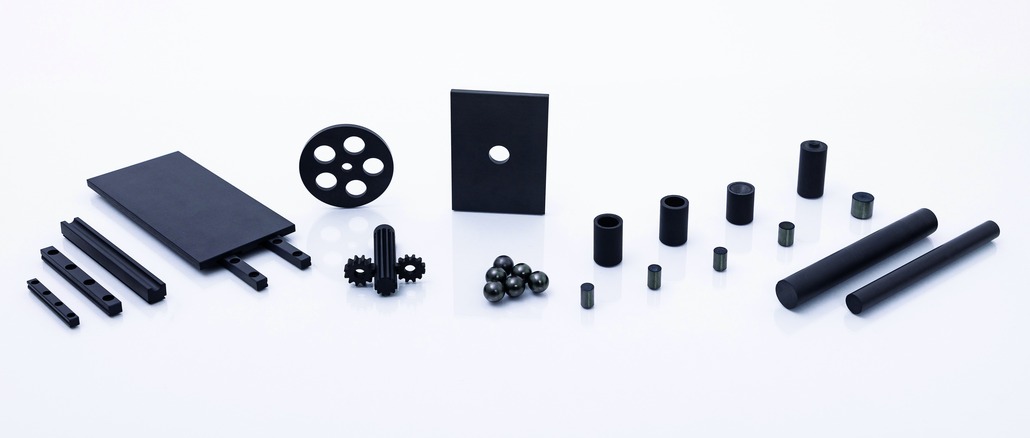
Numerous components in many machines used by modern industry are often made of steel or ceramic, depending on the conditions of use. Unfortunately, neither material is usable in all environments.
Steel, for example, is not suitable for high speeds due to its weight. In addition, it corrodes comparatively quickly unless it is provided with appropriate, costly protection.
Ceramic components, on the other hand, are associated with high acquisition costs that are hardly worthwhile for many applications. In addition, ceramics are less amenable to mechanical processing, which limits shaping.
However, MLC Metal Like Ceramics GmbH has now succeeded in developing a material that combines the advantages of steel and ceramics. Thanks to the special manufacturing process, MLC GmbH can produce a starting material that can be molded cost-effectively using extrusion or injection molding processes. Subsequent heat treatment transforms the workpiece into a lightweight ceramic product that outperforms steel in terms of temperature, corrosion and wear resistance.
The choice of components such as rolling and ball bearing variants or linear guides for machine manufacturers is wide, because each machine environment places different demands on the materials. While steel is valued for its ease of machining, it is less suitable in areas prone to corrosion without expensive special alloys. Very high speeds are also only possible to a limited extent with the heavy material. In general, harsh environments such as corrosion increase material fatigue by damaging the material structure.
“Where steel bearings reach their limits, hybrid bearings or even all-ceramic bearings are usually used,” explains Dr. Michael Schubert, head of product and process development at MLC. “All-ceramic bearings offer major advantages over the other two bearing types, especially in terms of wear, corrosion and temperature resistance in demanding application types. However, they come with higher initial costs that cannot be justified for every situation.”
Ultimately, machine manufacturers are dependent on keeping various bearing types on hand and installing them accordingly, depending on the machine design and subsequent place of use. Therefore, MLC has developed its own material that combines the respective advantages of steel and ceramics. Compared to steel, the material is more robust, weight-reduced and wear-resistant, while at the same time being easier to machine and shape than conventional ceramics. This provides a universal material for the manufacture of numerous bearing and component variants, with production and acquisition costs significantly lower than for classic hybrid and solid ceramics made from standard ceramics such as SiN.
Special process enables cost-effective production
The good material properties result from the patented material mixture. The special manufacturing process in turn allows a high degree of design freedom and comparatively low costs for the production of MLC.
“In classical ceramic manufacturing, complex production takes place through the powder technology used, which offers only limited possibilities in terms of geometry and shaping, so that subsequent sintering processes are required. Green body manufacturing thus becomes a relatively expensive production step, so that the use of all-ceramic components wants to be well considered,” explains Dr. Schubert. MLC GmbH, on the other hand, produces its material – which bears the name MLC – in a first step from a polymer base material that is enriched with active and passive fillers. This mass can then be processed cost-effectively by proven plastics industry processes, such as extrusion or injection molding, and converted into an initial preform. The polymeric material serves as a plastic matrix material for the fillers.
With the help of an initial heat treatment, the preform is transformed into a machinable green body. This has a texture similar to plexiglass, which means that a near-net-shape component can be machined out with only minimal mechanical effort. Due to this easy machining, almost all desired geometries can be realized and tool wear is extremely low compared to machining other materials. Finally, the component formed from the green body is finally strengthened in a high-temperature step, giving it its steel-like hardness of 1000 HV. In the process, the silicone resin is completely converted and residues are left behind. For high-precision components, the ceramic material can therefore be reworked without great effort and the use of expensive tools such as diamond grinders.
Areas of application from lightweight construction to medical technology
Users in a wide range of industrial sectors benefit from the combined advantages of the ceramic material in terms of robustness and resistance. Thus, MLC is suitable for clean room and vacuum components, as well as corrosive or dirty environments where poor lubrication conditions prevail.
“The performance of our material is no more affected by such factors than it is by fluctuating or high temperatures,” says Dr. Schubert. Since shaping and production can be carried out very flexibly and comparatively easily, the application is also conceivable beyond pure bearing and drive components. These include printed circuit board and semiconductor manufacturing, electronics and mechatronics, lightweight construction, medical technology, and use in plastics processing plants.
“We are continuously developing the material further with partners to enable new areas of application such as processing in 3D printing. To this end, we are expanding our manufacturing capabilities and will continue to rely on partnerships in the future in order to be able to establish MLC as a universal material,” sums up Dr. Schubert.
MLC Metal-Like Ceramics
MLC Metal-Like Ceramics from Hofheim in Franconia specializes in functional rolling bearing ceramics and the continuous further development of the material as a sustainable material. Thanks to a special manufacturing process, the so-called Metal-Like Ceramic (MLC) makes it possible for the first time to bring the advantages of ceramic material in line with steel-like material characteristics. This opens up numerous applications where conventional ceramics or steels have disadvantages, for example in terms of weight or corrosion resistance. The company carries out the production and further development of the material in Hofheim and with partners in the immediate region.
Web:
www.ml-ceramics.com

